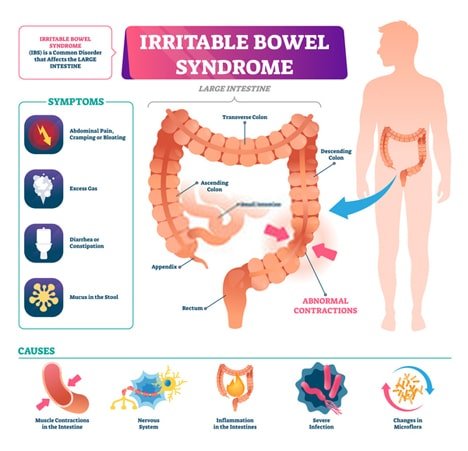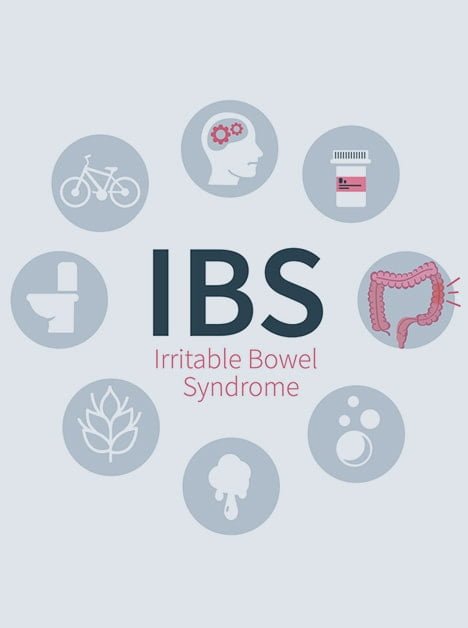What Is Irritable Bowel Syndrome (IBS)?

Irritable bowel syndrome, or IBS, is a common medical condition that affects your intestines and is diagnosed by the best-in-class NYC IBS doctor. IBS can cause abdominal pain, gas, bloating, cramping, diarrhea, and/or constipation. IBS symptoms can often be accompanied by other overlapping symptoms and be difficult to identify as the cause of your symptoms.
Our specialists investigate the cause of each patient’s IBS symptoms and find the best treatments that may be effective for them.
Bloating and the feeling of not having emptied the bowels, so needing to return to the toilet shortly after a bowel action are other symptoms of irritable bowel syndrome that gastroenterologist’s patients typically have. Many people who have IBS find that stress and certain foods aggravate their symptoms. If you have IBS, your large intestine may be more sensitive to stimulation, so it can spasm for no apparent reason, causing the uncomfortable symptoms mentioned above. In many cases, our gastroenterologists can treat (or at least comfortably control) with dietary, lifestyle changes, medications, and other modalities after establishing a diagnosis.
”
★ ★ ★ ★ ★My experience with Dr. Tsynman was fantastic. I didn’t have to wait long to see him, and he showed real concern. He’s very sweet. He asked all the necessary questions and then listened to what I had to say about my symptoms. For once, I feel like someone is finally paying attention to my lower GI issues, and, God willing, I’ll finally have some answers.
How Common Is IBS?
IBS is extremely common. In the United States, approximately 10 to 15% of the adult population suffers from IBS symptoms, but only 5 to 7% of adults have been diagnosed. Patients should always be evaluated by a gastroenterologist for an accurate diagnosis and treatment plan in order to rule out an underlying serious illness or condition. Depending on your case, blood work, stool studies, breath tests, and other diagnostic tests such as endoscopy or colonoscopy may be required to secure a proper diagnosis.
Symptoms of Irritable Bowel Syndrome
Symptoms include diarrhea, constipation, and sometimes both at different times. Cramps, bloating, and gas may also occur. Another symptom is the presence of mucus in your stool. If you have IBS, you may feel the urge to urinate but nothing comes out. Because some IBS symptoms are also symptoms of more serious conditions, you should consult your irritable bowel syndrome doctor or one of our Manhattan (NYC) gastroenterologists for a proper diagnosis.
How Does IBS Affect My Body?
Although IBS can be painful, it does not cause lasting harm to your intestines or predispose you to serious diseases like cancer.
However, this condition can sometimes result in a number of non-intestinal “extraintestinal symptoms”, including:
- Headaches
- Back pain
- Fatigue
- Pain and clicking in the jaw
- Dry mouth or dry eyes
- Chronic pelvic pain
- Decreased sexual drive
- Painful sexual intercourse
- Muscle aches and pains
- Urinary urgency or hesitation
- Bladder spasms
In addition, depending on its severity, IBS can significantly impact sufferers’ day-to-day lives, putting them at higher risk of developing mental health conditions such as anxiety, sleep disturbances, and depression. Emotional distress, in turn, affects bowel habits and may worsen IBS symptoms.
Irritable Bowel Syndrome (IBS) is a prevalent gastrointestinal disorder affecting a significant portion of the global population. Studies estimate that approximately 5% to 10% of individuals worldwide experience IBS symptoms. In the United States, the prevalence ranges from 10% to 15%, with a higher incidence observed in women. IBS is most commonly diagnosed in individuals under the age of 50, though it can affect people of all ages.
Causes of Irritable Bowel Syndrome

Although there are numerous theories, the exact cause or causes of irritable bowel syndrome are unknown. As your body absorbs nutrients and fluids, the muscles in your large intestine move food along. When you have IBS, your muscles may not work properly, flushing food too quickly or stagnating with food stuck there. This dysfunction causes the symptoms described above.
Although not everyone is affected in the same way, women are more likely than men to report the condition. Certain foods, such as dairy, chocolate, and even fruits and vegetables, can cause IBS symptoms. Artificial sweeteners, alcohol, caffeine, and carbonated beverages might also be triggers. Medicine, such as antibiotics, can contribute to it as well. Stress, hormones, and genetics also can play a role in the onset of IBS. Unhealthy food habits, sedentary lifestyles, medications, and other factors can be triggers.
Furthermore, IBS frequently occurs as a result of gastrointestinal diseases, a microbiome imbalance, or conditions such as SIBO (small intestinal bacterial overgrowth), which could be a trigger or a confounding factor. Our Manhattan Gastroenterology experts believe that some people’s bowels are simply more sensitive than others. However, in order to make an accurate diagnosis, we must rule out many other causes.
The exact reason for IBS development remains unclear but based on a study published recently on PubMed, our nervous and gastrointestinal systems are more connected to it than we realize. Our subconscious mind has a strong influence on the muscles of the small intestine. When we are stressed, our intestine responds by spasming. Doctors suggest that leading a healthy lifestyle with adequate physical activity and a healthy diet will always be beneficial.
Look over the article: Gain Control of Your Irritable Bowel Syndrome by Keeping a Food Journal
Risk Factors for Irritable Bowel Syndrome
The exact reason why some people experience IBS and its symptoms isn’t fully understood.
However, the more of the following risk factors you have, the more likely you are to develop this condition:
- Being under the age of 50
- Being female
- Consuming certain foods
- Experiencing hormonal imbalance
- Having a family history of IBS
- Being under severe stress
- Having a mental health illness
Women are more likely to be affected by IBS and may have more symptoms during their menstrual periods.
Diagnosing Irritable Bowel Syndrome
If you have irritable bowel syndrome, one of our IBS doctors will go over your medical history and perform a thorough physical examination. Because its symptoms are similar to those of more serious conditions, our NYC gastroenterologists will not be able to diagnose IBS until those other conditions have been ruled out. They may be required to order laboratory tests or perform diagnostic procedures such as colonoscopy or an endoscopy.
In general, if you have any irritable bowel syndrome symptoms, you should seek medical attention. Before you go to the doctor, keep track of how frequently your symptoms occur and how long they last. This type of information may help your specialist diagnose the problem. Our doctors may recommend you undergo a set of tests to learn more about your condition. Typical tests that we may recommend include a colonoscopy, blood tests, stool studies, and a variety of other tests as determined by your gastroenterologist.
What Are the Different Types of IBS?
Doctors often classify IBS into one of four types based on your usual stool consistency. These types are important because they affect the types of treatment that are most likely to improve your symptoms.
The four types of IBS are: (criteria and categorizations can change over time)
IBS with constipation, or IBS-C
- Hard or lumpy stools at least 25 percent of the time
- Loose or watery stools less than 25 percent of the time
IBS with diarrhea, or IBS-D
- Loose or watery stools at least 25 percent of the time
- Hard or lumpy stools less than 25 percent of the time
Mixed IBS, or IBS-M
- Hard or lumpy stools at least 25 percent of the time
- Loose or watery stools at least 25 percent of the time
Unsubtyped IBS, or IBS-U
- Hard or lumpy stools less than 25 percent of the time
- Loose or watery stools less than 25 percent of the time
IBS has recurrent abdominal pain plus two or more of:
- Pain from defecation
- Altered stool at the onset of pain
- Abdominal bloating
- Increased or decreased stools at the onset of pain
- A ‘never empty’ sensation after passing stool
- Passing mucus from the rectum
- Morning cluster of motions
- Constipation alternating with diarrhea
Treating Irritable Bowel Syndrome
There is no single treatment for IBS that will work for everyone because there is no known cause of the condition, and it appears to affect different people differently. Many irritable bowel syndrome treatments have been proven to be effective in the past, so our IBS specialists have several options to help you.
Diet and lifestyle changes, such as eliminating gassy foods and beverages, can be part of IBS treatment. Other options include a range of medications. Antibiotics, diarrhea medications, several other newly approved medications, and even antidepressants can sometimes be effective IBS diarrhea treatments.
The goal of pharmacological management is to treat diarrhea or constipation, and patients with IBS-M may require a combination of treatments.
Among the therapeutic options for relieving abdominal pain in IBS patients are:
- Antispasmodics
- Peppermint oil
- Selective serotonin reuptake inhibitors (SSRIs) such as Citalopram, Escitalopram, Fluoxetine
- Tricyclic antidepressants such as Amitriptyline, Desipramine, Doxepin, etc.
Treatments for Irritable Bowel Syndrome With Diarrhea (IBS-D) include:
- Opioid agonists
- Antibiotics
- Bile salt sequestrants
- Probiotics
- Mixed opioid agonists/antagonists
- 5-HT3 antagonists
Treatments for IBS Constipation (IBS-C) may include:
- Chloride channel activators
- Polyethylene glycol (PEG)
- Psyllium
- Guanylate cyclase C agonists
Preventing Irritable Bowel Syndrome
There are several self-care preventive measures you can try to reduce your risk of IBS or to increase the time between flare-up episodes, such as:
- Healthy IBS diet – The first line of defense is to avoid gluten, a protein found in wheat, barley, rye, and many processed foods. Gluten sensitivity can cause inflammation in your body’s organs and soft tissue, exacerbating your IBS symptoms. Reducing your consumption of lactose (found in milk and other soft dairy products), fructose (found in fruits and honey), carbohydrates, and sugar substitutes is also a good way to avoid experiencing IBS symptoms. Consider aiming for a fiber intake that works for you, drink plenty of fluids, and eat at the same time each day.
- Regular exercise – Increased physical activity can help improve current IBS symptoms and prevent the emergence of new manifestations. Furthermore, exercise can help improve your overall quality of life and symptoms associated with gastrointestinal disorders, such as depression and fatigue.
- Stress reduction – According to the recent research published on PubMed, mindfulness-based stress reduction has proven to be highly effective in improving gastrointestinal symptoms and associated problems in IBS patients.
Because IBS is a multifactorial condition with no clear cause, there is no single self-care technique we can point out as a preventive measure. However, you can make strides to avoid IBS symptoms by incorporating a healthy diet, reducing stress, and improving your current fitness level.
How Can You Control IBS?
Avoiding the trigger is the key to controlling and managing IBS symptoms. Some common triggers for those with IBS include certain foods or drinks, stress or anxiety, and hormone fluctuations.
When Should You See a Healthcare Provider?
While many learn to live with IBS, seeking additional medical attention is crucial if:
- You experience sudden or extreme changes in IBS symptoms
- Medications and diet changes fail to provide results
- You must avoid a wide variety of foods to control your symptoms
Irritable bowel syndrome has a negative impact on both your health and overall quality of life.
Ignoring this condition or failing to seek treatment can lead to serious gastrointestinal complications.
What to Eat When You Have Ibs?
The digestive system is typically an excellent and well-functioning mechanism. However, when something goes wrong, the entire system suffers. A well-planned and well-matched nutrition and diet can help ease or eliminate symptoms.
Different diets may help different people with IBS. New York specialists suggest changing your diet for a few weeks to see if your symptoms improve. Or it could take a little longer. The main goal, however, is to achieve balance and improve your eating habits.
Manhattan Gastroenterology’s IBS specialists recommend the following dietary changes to help treat irritable bowel syndrome (IBS) symptoms:
- eat more fiber
- avoid gluten
- follow a low FODMAP diet
Nutritional therapy must be highly personalized, so consult with your gastroenterologist. Among the possibilities are the following:
Avoid gluten
Gluten is a protein found in wheat, barley, and rye. Gluten-containing foods include most cereals, grains, pasta, and many processed foods. Specialists observed that some people with IBS have more symptoms after eating gluten, even though they do not have celiac disease.
Low FODMAP diet
There is a diet known as the low FODMAP diet. Some foods contain difficult-to-digest carbohydrates. These carbohydrates are referred to as FODMAPs. Apples, apricots, blackberries, cherries, mango, nectarines, pears, plums, watermelon, and juice containing any of these fruits are examples. Artichokes, asparagus, beans, cabbage, cauliflower, garlic and garlic salts, lentils, mushrooms, onions, sugar snap peas, and snow peas are examples of vegetables. Milk, milk products, soft cheeses, yogurt, custard, and ice cream are examples of dairy products. Honey and foods containing high-fructose corn syrup are also good examples.
We suggest trying the low FODMAP diet for a few weeks at our IBS treatment center to see if it helps with your symptoms. If your symptoms improve, our specialist may recommend you gradually reintroduce FODMAP-containing foods into your diet. You may be able to eat some FODMAP-containing foods without experiencing IBS symptoms. Nutritional therapy must be highly personalized, so consult with your gastroenterologist.
Complications of Irritable Bowel Syndrome
The severity of IBS symptoms can lead to both physical and mental health complications, ultimately resulting in increased absences from school and work, limitations in social functioning, and the need to make lifestyle modifications.
Physical health complications that may result from IBS include:
- Anal fissures
- Hemorrhoids
- Fecal impaction
- Rectal prolapse
- Malnourishment
Mental health complications that can develop due to IBS include:
- Depression
- Generalized and social anxiety
- Agoraphobia
While not life-threatening, IBS is physically debilitating, unpredictable, and often a long-lasting problem that changes the way you live your life. That’s why you should consult an experienced gastroenterologist to receive proper care and learn how to keep your symptoms at bay.
Important Reminder: The only intent of this information is to provide guidance, not definitive medical advice. Please consult a GI doctor about your specific condition. Only trained, experienced doctors can determine an accurate diagnosis and proper IBS treatment for irritable bowel syndrome (IBS).
A skilled irritable bowel syndrome doctor can diagnose and treat IBS with a personalized approach. As best-rated NYС gastroenterologists offer highly personalized and comprehensive IBS treatment care. Please contact the Union Square/Chelsea, Midtown Manhattan, or Upper East Side NYC (Lenox Hill, Manhattan Valley, Upper West Side, Carnegie Hill, Yorkville) offices for more information on the best treatment for Irritable Bowel Syndrome (IBS) or to schedule a consultation with one of the top irritable bowel syndrome specialists.

















